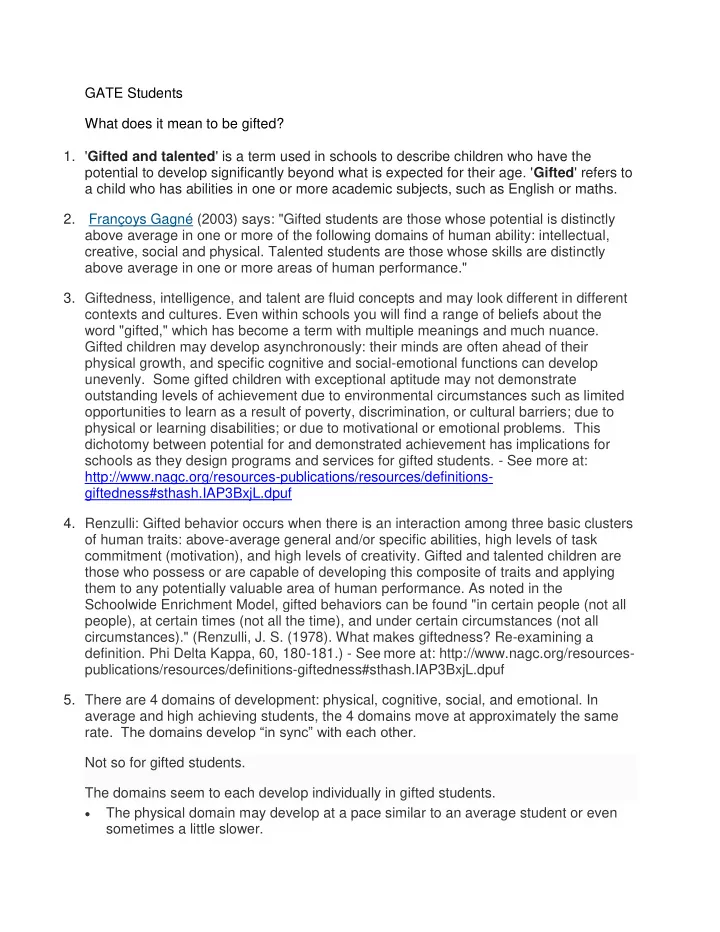

GATE Students What does it mean to be gifted? 1. ' Gifted and talented ' is a term used in schools to describe children who have the potential to develop significantly beyond what is expected for their age. ' Gifted ' refers to a child who has abilities in one or more academic subjects, such as English or maths. 2. Françoys Gagné (2003) says: "Gifted students are those whose potential is distinctly above average in one or more of the following domains of human ability: intellectual, creative, social and physical. Talented students are those whose skills are distinctly above average in one or more areas of human performance." 3. Giftedness, intelligence, and talent are fluid concepts and may look different in different contexts and cultures. Even within schools you will find a range of beliefs about the word "gifted," which has become a term with multiple meanings and much nuance. Gifted children may develop asynchronously: their minds are often ahead of their physical growth, and specific cognitive and social-emotional functions can develop unevenly. Some gifted children with exceptional aptitude may not demonstrate outstanding levels of achievement due to environmental circumstances such as limited opportunities to learn as a result of poverty, discrimination, or cultural barriers; due to physical or learning disabilities; or due to motivational or emotional problems. This dichotomy between potential for and demonstrated achievement has implications for schools as they design programs and services for gifted students. - See more at: http://www.nagc.org/resources-publications/resources/definitions- giftedness#sthash.IAP3BxjL.dpuf 4. Renzulli: Gifted behavior occurs when there is an interaction among three basic clusters of human traits: above-average general and/or specific abilities, high levels of task commitment (motivation), and high levels of creativity. Gifted and talented children are those who possess or are capable of developing this composite of traits and applying them to any potentially valuable area of human performance. As noted in the Schoolwide Enrichment Model, gifted behaviors can be found "in certain people (not all people), at certain times (not all the time), and under certain circumstances (not all circumstances)." (Renzulli, J. S. (1978). What makes giftedness? Re-examining a definition. Phi Delta Kappa, 60, 180-181.) - See more at: http://www.nagc.org/resources- publications/resources/definitions-giftedness#sthash.IAP3BxjL.dpuf 5. There are 4 domains of development: physical, cognitive, social, and emotional. In average and high achieving students, the 4 domains move at approximately the same rate. The domains develop “in sync” with each other. Not so for gifted students. The domains seem to each develop individually in gifted students. The physical domain may develop at a pace similar to an average student or even sometimes a little slower.
The cognitive domain develops at a much faster pace than the average student. The social domain might develop at a similar or slower pace that an average student The emotional domain develops faster that for an average student. What’s it like to be a gifted student? Gifted students often find themselves in a setting where they have no common interests with any of the students around them. The more developed cognitive area is why gifted learners are able to work with abstract concepts, whereas the normal and high achieving students prefer and need more concrete concepts. As educators, it’s important to realize gifted and talented students are raw ore waiting t o be refined into men and women who will one day make great contributions to society. Sometimes we forget it’s our legal duty to find students who have the capability of high performance. The law doesn’t say they are already high -performing when we find them. It’s says we need to find the students with the capability for high performance. Gifted students are like raw ore and we have 12 years to refine them. That’s why it’s so important that our gifted programs provide settings where gifted students can grow and develop. Problems Resulting From Advanced Verbal and Reasoning Ability 1. Gifted children can be argumentative and/or manipulative. (Adults often remark that theses children are little lawyers!) Parents and other adults need to remember that, although credit should be given for logical and convincing arguments, a child is still a child and requires appropriate discipline, no matter how clever or cute the behavior may look. Children who see that they can manipulate adults can feel very insecure. 2. Gifted children can be manipulative. (Parents and other adults need to take care that they don't allow this manipulation.) 3. A gifted child may try to outsmart parents and teachers. 4. Sophisticated vocabulary and advanced sense of humor can cause gifted children to be misunderstood, which can make them feel inferior and rejected. (This is one reason gifted children prefer to be around older children and adults.) Problems Resulting From Perfectionism and Emotional Sensitivities 1. Perfectionism can lead to fear of failure, in turn causing a gifted child to avoid failure by refusing to even try something (including doing a homework assignment!) 2. Keen observation, imagination, and ability to see beyond the obvious can cause a gifted child to appear shy, holding back in new situations in order to consider all the implications. 3. A gifted child may require full details before answering questions or offering help, making him or her appear socially shy. 4. Intense sensitivity can cause gifted children to take criticism, or even general anger, very personally. Childhood slights do not roll off their backs.
5. Sensitivity and well-developed sense of right and wrong can lead to concern over wars, starving children, pollution and other injustice and violence. If they are overloaded with images and discussions of these issues, they can become introverted and withdrawn or even suffer from "existential depression .” Identification of GATE Students A Practical System for Identifying Gifted and Talented Students Joseph S. Renzulli, http://www.gifted.uconn.edu/sem/semart04.html Identification http://www.nagc.org/resources-publications/gifted-education-practices/identification
Recommend
More recommend